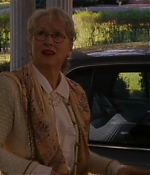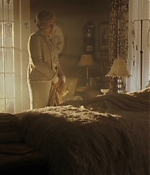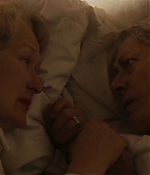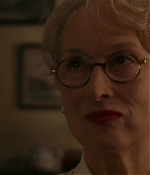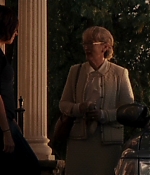|
Simply Streep is your premiere source on Meryl Streep's work on film, television and in the theatre - a career that has won her the praise to be one of the world's greatest working actresses. Created in 1999, we have built an extensive collection to discover Miss Streep's body of work through articles, photos and videos. Enjoy your stay.
|
Celebrating
25 years
of SimplyStreep
|
Evening
June 29, 2007
· Focus Features
· 117 minutes
|

In writing her novel Evening, author Susan Minot had hoped that “anyone following the woman’s story would think about what’s important in their own lives, what they cared about the most, and how they would want to live their own lives moving forward.” Like so many readers of the beloved best-seller, producer Jeffrey Sharp’s affinity for the novel was at once highly personal and universal. He remarks, “The novel explores a woman’s look back at her life while her children sit at her bedside, learning more about secrets from their mother’s past.” Over the course of a year, with Minot’s help, Sharp was able to acquire the film rights to the book, which had been previously optioned. He notes, “Also with Susan’s help, I reconceived Evening as an independent feature.” Several drafts of the screenplay followed. Drawn, like everyone else, by the universality of the story and the themes, a mother/daughter acting duo would soon come aboard Evening. Sharp notes, “Mamie Gummer came in to audition for the role of Lila, and really got to the core of the character.”
Gummer elaborates, “Lila comes from blue-blood privilege, but feels trapped by it. She would give it all up in a heartbeat if the man she is truly in love with – which is not the man she’s set to marry – would have her. I was drawn to her sadness, and to the story’s exploration of the conflict between love and societal compromise, which is as old as time. “Ann and Lila were drawn to each other in college, and they formed a sisterly bond. Off-camera, Claire and I perfected that friendship.” Claire Danes offers, “I really loved playing scenes with Mamie; it’s not often that I have the opportunity to play out a female friendship of true intimacy on-screen. She is a gifted and beautiful actress, and we are now great friends ourselves.” Sharp reveals, “Mamie had blown us all away in one audition, and then again in another that we scheduled because she was so great the first time. Lajos immediately wanted her to play Lila Wittenborn; it was only afterwards that we told him that Mamie is related to an actress named Meryl Streep. Mamie said that she was really happy that she could help her mother find a job.” Danes adds, “Mamie and I were able to watch dailies of a scene that Meryl and Vanessa have together, so that we could echo it in a parallel scene we have together. We were thrilled watching it, but also thought, ‘We’re supposed to match that…?’ But our scene – on the morning of Lila’s wedding – was just so well-written; there are three distinct chapters within it.” Gummer concurs, “It was all there on the page; it’s my favorite scene in the film, and so moving. “My Mom and I had joked about maybe giving Lila a limp for continuity, but we didn’t follow through on that. So Claire and I watched the dailies of the other scene – which was staggering – the night before we shot ours, and tried to sort of emulate that.”
“Evening” looks and feels like a kitschy greeting card. Unfortunately, the dialogue is on the same level. Even the best actors – and there are quite a few in this one – can’t help to bring a film forward that has no story to care about. Each and every character is unhappily in love – Lila is about to marry someone whom she doesn’t love, because she’s in love with Harris. Ann is loved by Lila’s brother Buddy, but doesn’t love him back because she falls in love with Harris who prefers her over Lila. Got it? If all that happens on just one weekend, I don’t want to know those people’s full week. Each character’s storyline is given time, which is usually a good thing – but here it doesn’t bring the story forward. The subplots of Ann’s grown daughters add nothing to the overall story and just lengthen the film, which is too long with a running time of two hours. What’s disappointing about the cast as a whole is that most of the actors show up in only small cameo performances. Sometimes it works, like Meryl’s scene with Vanessa Redgrave, which I’m sure was the reason to do the film. Sometimes it just doesn’t, such as Glenn Close’s hammy performance as Lila’s mother. And I’m still not sure if Toni Collette is playing the bad-tempered character so convincingly, or if she just realised she was in a wrong film. But “Evening” has paid its duties for one actress, and that’s Mamie Gummer. It’s a subtle and well excecuted role in a first major film and critics have noticed. Since “Evening”, she’s been able to start a successful career on the stage and television since. Although the film tries, it doesn’t work on the big screen – maybe it would have been placed better on the Lifetime Channel. It’s funny though that a film about so much unfulfilled love has been a common ground for Claire Danes and Hugh Dancy to meet and fall in love. They have been married since. So I guess, no matter how disappointing “Evening” is as a film, it has worked out well for Danes and Dancy at least.

